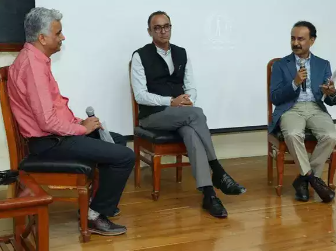Examples of Ethics (GS Paper 4, Applications of Ethics)

Longevity India Initiative
Context
- The Indian Institute of Science (IISc) has launched the ‘Longevity India Initiative’ to promote healthy ageing by researching overcoming challenges associated with growing older.
- The initiative focuses on identifying early disease indicators, researching ageing biomarkers, and developing new therapeutics and technologies.
Ethical Values exhibited by the Initiative are:
- Respect for Human Dignity: By challenging the idea that ageing is inevitable and aiming to increase human health span
- Collaboration and Partnership: The involvement of multiple stakeholders, including researchers, clinicians, industry partners, philanthropists, and civil society
- Equity and Inclusivity: By considering factors like lifestyle and culture, especially in a diverse country like India
- Responsibility and Accountability: The initiative recognizes the urgency of addressing the growing burden of ageing in the country and emphasizes the need for diverse stakeholders to come together and take responsibility for developing solutions.
Misuse of Public Money by three IAS officers
Context
- Three senior IAS officers from the Chandigarh Administration made unauthorized expenditures of over Rs 6 lakh during a trip to Paris in 2015.
- The recent audit report highlighted that they changed hotels and overstayed for a meeting meant for a lower-ranking official.
The ethical issues highlighted in this case:
- Misuse of Authority: The senior IAS officers misused their authority by making unauthorized expenditures and changing the purpose of the trip to Paris.
- Financial Impropriety: The officers incurred unauthorized expenses amounting to over Rs 6 lakh, which were not justified and did not follow proper procedures.
- Lack of Transparency: The officers did not obtain proper approvals or certificates regarding the visit, and the purpose of the trip was misrepresented.
- Breach of Trust: By overstaying and switching hotels without proper authorization, the officers breached the trust placed in them by the government and taxpayers.
- Violation of Norms: The officers exceeded the allowed duration for foreign travel, did not obtain necessary approvals, and disregarded established norms and procedures.
Nestle infant milk in poorer countries has a higher sugar content compared to developed countries
Context
- Public Eye, a Swiss investigative organization, along with the International Baby Food Action Network, uncovered this issue.
- The World Health Organization (WHO) warns that early exposure to sugar can lead to a lifelong preference for it, heightening the risk of obesity and other chronic diseases.
Ethical Issues in this case:
- Health Impact: Higher sugar content in infant milk can lead to health issues such as obesity and chronic illnesses, especially considering the vulnerability of infants.
- Transparency: There’s a lack of transparency regarding the nutritional content of Nestle infant milk, particularly in poorer countries
- Targeting Vulnerable Populations: Marketing products with higher sugar content to poorer countries, where health resources and education might be limited, can be seen as exploitative and unethical.
- Equity: Discrepancies in sugar content between products sold in different countries can raise questions about equity and fairness in access to healthier nutritional options.
- Breach of trust: Selling an inferior product breaches consumer trust.
Regulations
- Thev Codex Alimentarius sets global standards for food safety and quality, established by the joint effort of the Food and Agriculture Organization and WHO.
- In India, the Food Safety and Standards Act 2006 define regulations and establishes the Food Safety and Standards Authority of India as the apex regulatory body for ensuring food safety and quality.


